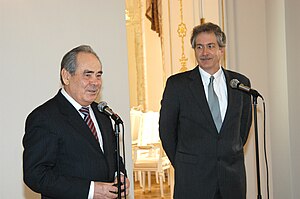 Image via WikipediaAfghanistan has an annual revenue of $1 billion. And we're spending $1.26 billion to train the Afghan National Police. Both OIGs for the State Department and Defense Department are not impressed at how State is handling the DOD funds for the police force we're building there.
Image via WikipediaAfghanistan has an annual revenue of $1 billion. And we're spending $1.26 billion to train the Afghan National Police. Both OIGs for the State Department and Defense Department are not impressed at how State is handling the DOD funds for the police force we're building there.
The joint OIG report recommends that "DoD and DOS officials [....] develop procedures for monitoring the obligation and expenditure of DoD funds for the ANP training program and initiate a potential Antideficiency Act violation investigation. Also, DOS should increase the scope of the pre-payment invoice reviews to identify and reject costs that were not authorized or services not provided before payment." From the summary of the report:
DOS officials did not appropriately obligate or return to DoD approximately 172.40 million of approximately $1.26 billion of DoD funds provided for the ANP training program. This occurred because DOS lacked adequate procedures for obligating, monitoring, and deobligating DoD funds for the ANP training program. Moreover, DoD officials did not validate whether the Bureau of International Narcotics and Law Enforcement Affairs (INL) officials obligated funds in accordance with the reimbursable agreements. In addition, the DOS contracting officer’s representative approved contractor invoices for payment for approximately $2.07 million that were either not authorized or were for services not provided. This occurred because DOS officials did not always perform a detailed review of invoices before payment and relied on a post-payment review of invoices to identify overpayments and obtain refunds from the contractor. As a result, we identified total potential monetary benefits of approximately $124.62 million.*
When recovered, these funds could be used for valid ANP training program requirements or other DoD requirements. In addition, if not corrected, incorrect obligations of approximately $74.91 million could result in potential Antideficiency Act violations.
Here is what $1,000,000,000 dollars look like (via wtfnoway.com visualizing the U.S. debt): So these pallets of money plus change is what we're spending on building a police force in Afghanistan. So hey, State can't make heads or tails over this big chunk of money; can you blame them for mishandling the funds?
 |
| image by wtfnoway.com |
In 2006, an Interagency Assessment of Afghanistan Police Training and Readiness summarized the end-state of the police program in Afghanistan as follows:
"The intended end state of the U.S.-funded APP is an effective, well-organized,professional, multiethnic national police force that is trained and equipped to provide a safe and secure environment for the people of Afghanistan and a force committed to the rule of law. The ANP need to be led well, paid decent salaries, and trained and equipped to carry out their assigned security and law and order missions. The program’s goal is to establish a self-sustaining ANP – a police force able to attract and retain qualified candidates and to operate with minimal international assistance."The same assessment also made the following point:
"The high illiteracy rate among the police recruits is problematic. Obviously it is easier for the recruits to process the subject matter when they can read and write. In addition, the assessment team observed that the classes for literate recruits have more lively discussion and more student participation than do the illiterate classes. Nevertheless, there is no discernable difference between the literate and illiterate students during the practical exercises, such as high-risk traffic stops, handcuffing, building searches, full contact baton training, and vehicle searches. It must be noted that illiterate policemen cannot perform the full spectrum of professional police duties. Thus, to the degree that the ANP is manned by illiterate personnel, it cannot meet the performance standards of a fully professional police force."Apparently we also reformed its pay structure, so that its Lt. General gets paid seven times its previous salary but a lowly patrolman gets $80 dollars a month, $10 dollars more than its previous salary:
Before Reform After ReformFinally, the assessment notes that the Afghan government does not/not have the revenue to pay its police.
$107 Lt General $750
$103 Maj General $650
$95 Brig General $550
$92 Colonel $400
$88 Lt Colonel $350
$83 Major $300
$78 Captain $250
$69 1st Lieutenant $200
$66 2nd Lieutenant $180
$62 Sergeant $115/$140/$160
$70 Patrolman $70/$80
Pay per month in USD
Imagine an end-state of the police program in Afghanistan that is self-sustaining, professional and multi-ethnic and blah, blah, blah ....presumably composed of the Pashtuns and the Tajiks, Hazaras, Uzbeks, Aimaks, Turkmen, Balochs and others.
This is obviously a problem, particularly in a country where the national literacy rate is 28.1%. Of course, every problem has a solution, silly!
Just yesterday, DOD showed off Dr. Jack D. Kem, the deputy to the NATO Training Mission Afghanistan commander, Army Lt. Gen. William B. Caldwell IV; he was touting the progress in the Afghanistan training mission:
The typical recruit is “physically fit, clear-eyed and they want to work,” Kem said. “They are survivors and highly motivated.” But they also are illiterate. “About 86 percent come in and can’t count to four,” he said. “They have not lived in wealth, so many have never seen running water or driven a vehicle. There are a lot of things that we have to do that wouldn’t be typical in the West.”
[...]
“We have 110,000 people in literacy courses,” Kem said. “In 10 years, school enrollment has gone from 800,000 to 8 million. Some of that is from our assistance.”
So to sum up --
The somebodies decided that Afghanistan must have a professional police force. Check.
Hard to make them professional when they're not literate.The somebodies proceeded to give them literacy courses. Check.
The somebodies also reformed their pay structure. Check.
When all is said and done, remember that Afghanistan does not have the money to pay the salaries of its police force.
Oh, Whiskey Tango Foxtrot - even IF we succeed in building a "professional" police force over there, who's going to write their checks when we're done visiting?
In the end-state imagined here, we'll be in Afghanistan like the song goes -- Forever and Ever Amen! And you call this a win/win situation?
Holy mother of goat and all her crazy nephews!
Related item:
DoD and DOS Need Better Procedures to Monitor and Expend DoD Funds for the Afghan National Police Training Program (Report No. D-2011-080 and AUD/CG-11-30)







